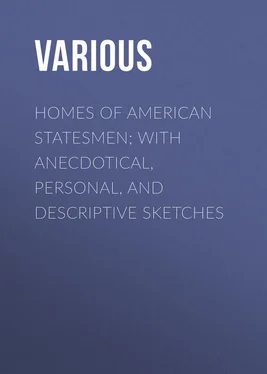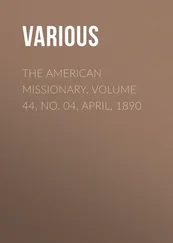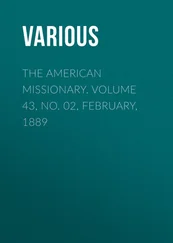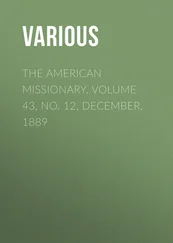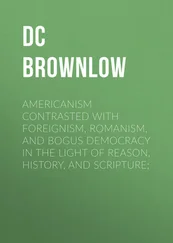Various - Homes of American Statesmen; With Anecdotical, Personal, and Descriptive Sketches
Здесь есть возможность читать онлайн «Various - Homes of American Statesmen; With Anecdotical, Personal, and Descriptive Sketches» — ознакомительный отрывок электронной книги совершенно бесплатно, а после прочтения отрывка купить полную версию. В некоторых случаях можно слушать аудио, скачать через торрент в формате fb2 и присутствует краткое содержание. Жанр: Медицина, История, foreign_edu, на английском языке. Описание произведения, (предисловие) а так же отзывы посетителей доступны на портале библиотеки ЛибКат.
- Название:Homes of American Statesmen; With Anecdotical, Personal, and Descriptive Sketches
- Автор:
- Жанр:
- Год:неизвестен
- ISBN:нет данных
- Рейтинг книги:5 / 5. Голосов: 1
-
Избранное:Добавить в избранное
- Отзывы:
-
Ваша оценка:
- 100
- 1
- 2
- 3
- 4
- 5
Homes of American Statesmen; With Anecdotical, Personal, and Descriptive Sketches: краткое содержание, описание и аннотация
Предлагаем к чтению аннотацию, описание, краткое содержание или предисловие (зависит от того, что написал сам автор книги «Homes of American Statesmen; With Anecdotical, Personal, and Descriptive Sketches»). Если вы не нашли необходимую информацию о книге — напишите в комментариях, мы постараемся отыскать её.
Homes of American Statesmen; With Anecdotical, Personal, and Descriptive Sketches — читать онлайн ознакомительный отрывок
Ниже представлен текст книги, разбитый по страницам. Система сохранения места последней прочитанной страницы, позволяет с удобством читать онлайн бесплатно книгу «Homes of American Statesmen; With Anecdotical, Personal, and Descriptive Sketches», без необходимости каждый раз заново искать на чём Вы остановились. Поставьте закладку, и сможете в любой момент перейти на страницу, на которой закончили чтение.
Интервал:
Закладка:
"The composition," so he wrote in his diary, "the pronunciation, the action, all exceeded the expectation of every body. [These last were certainly not Cooper's.] They exceeded even mine, which were very considerable. Many of the sentiments came with great propriety from him. His invective, particularly against a preference of riches to virtue, came from him with a singular dignity and grace." A passage in this oration, which was afterwards printed, on the subject of standing armies, gave great offence to the British officers and soldiers by whom the town continued to be occupied, and not long after Governor Gage dismissed Hancock from his command of the company of cadets; whereupon they disbanded themselves, returning the standard which the governor on his initiation into office had presented to them.
The sensibilities of the British officers and soldiers being again excited by some parts of an oration delivered the next year by Dr. Warren, on the same anniversary, a few weeks before the battle of Lexington, a military mob beset Hancock's house and began to destroy the fences and waste the grounds. Gage sent a military guard to put a stop to their outrages.
But it was no longer safe for Hancock to remain in such close contiguity to the British troops. He was president of the Provincial Congress of Massachusetts, which, in consequence of the act of parliament to modify the charter of that province, had lately assumed to themselves the power of the purse and the sword. He was also president of the provincial committee of safety, which, under authority of the Provincial Congress, had begun in good earnest to prepare for taking arms for the vindication of those rights which the men of Massachusetts claimed under the now violated and (so far as parliament had the power) abrogated Charter of the province. Under these circumstances, Hancock abandoned his house, which was subsequently occupied by Lord Percy as his headquarters; and at the time of the march of the British troops for Concord, he was living at Lexington, in company with Samuel Adams. Indeed it was supposed that one of the objects of this march was to seize the persons of those two patriots, to whom Gage seemed to point as the authors of the collision at Lexington by the issue of a proclamation, in which pardon was offered to all who, giving over their late traitorous proceedings, would furnish proof of their repentance and of their renewed allegiance to their king, by submitting to the authority of his duly appointed governor, and of the late act of parliament: but from this pardon John Hancock and Samuel Adams were excepted, their offences being too flagrant to be passed over without condign punishment.
Before the issue of this proclamation, Hancock had already proceeded to Philadelphia, where the famous Continental Congress of 1775 was already in session, composed, to a great extent, of the same members with its predecessor of the year before, but of which he had been chosen a member in place of Bowdoin. He was a fluent and agreeable speaker, one of those who, by grace of manner, seem to add a double force and weight to all which they say; yet in that illustrious assembly there were quite a number, including John Adams, from his own State, compared with whom he could hardly have claimed rank as an orator. There were also in that assembly several able writers; the state papers emanating from whose pens were compared by Chatham to the ablest productions of the republican ages of Greece and Rome; but Hancock was not one of those. There were men of business there who undertook, without shrinking, all the Herculean labors of organizing the army and navy, the treasury and the foreign office of the new confederation – but neither in this line does Hancock appear to have been greatly distinguished. And yet it was not long before, by his appointment as president of that body, he rose to a position in Continental affairs, no less conspicuous than that which we have seen him exercising in those of his own province. Circumstances led indeed to this situation, quite apart from Hancock's personal qualifications, and yet had he not possessed those qualifications in a high degree, he would never have had the opportunity of immortalizing himself as he has done by his famous signature at the head of the Declaration of Independence, – a signature well calculated to give a strong impression with those who judge of personal character by handwriting, of the decided temper and whole-hearted energy of the man. Virginia, as the most populous and wealthy of the colonies, had received the compliment of furnishing the President of the Congress of 1774; and Peyton Randolph – a planter and lawyer, an elderly gentleman of the old school, formerly attorney general of that province, and in Governor Dinwiddie's time, sent by the Assembly on a special message to England, to complain of the governor for the fees he exacted on patents of land – had been first selected for that distinguished station. He had again been chosen as President of the new Congress; but being also speaker of the Virginia House of Burgesses, and that body having been called together by Lord Dunmore, in what proved to be its last meeting, to consider Lord North's conciliatory propositions, it became necessary for Randolph to return home. His place in Congress was filled, in compliance with an arrangement previously made by the House of Burgesses, by no less distinguished a successor than Thomas Jefferson; but in filling up the vacant seat of President of Congress, during what was then regarded as but the temporary absence of Randolph, it was natural enough to look to Massachusetts, the next province to Virginia in population and wealth, no ways behind her in zeal for the cause, and, as the result proved, far her superior in military capabilities. Nor among the delegates present from Massachusetts, was there any one who seemed, on the whole, so well fitted for the station, or likely to be at all so satisfactory to the delegates from the other States, as John Hancock. Had James Bowdoin been present, he would perhaps have been more acceptable to the great body of the members than Hancock, as being less identified than he was with violent measures. But though chosen a delegate to the first Congress, the sickness of Bowdoin's wife had prevented his attendance; and the same cause still operating to keep him at home, John Hancock had been appointed, as we have mentioned, in his place. Of Hancock's four colleagues, all of whom were older men than himself, Samuel Adams certainly, if not John Adams also, might have disputed with him the palm of zeal and activity in the revolutionary cause; but not one of them risked so much as he did, at least in the judgment of his fellow-members from the middle and southern provinces, who were generally men of property. He alone, of all the New England delegates, had a fortune to lose; and while his wealthy southern colleagues looked with some distrust upon the Adamses, regarding them perhaps a little in the light, if we may be pardoned so coarse an illustration, of the monkey in the fable, who wished to rake his chestnuts out of the fire at the risk and expense of other people's fingers, no such idea could attach to Hancock, who, in point of fortune, had probably as much to lose as any other member, except perhaps John Dickinson – for the wealthy Charles Carrol, of Maryland, had not a seat in the Congress. At the same time Hancock's genial manners and social spirit, seemed to the members from the southern and middle provinces to make him quite one of themselves, an associate in pleasure and social intercourse, as well as in business; while the austere spirit and laborious industry of the Adamses threatened to inflict upon them the double hardship of all work and no play. But while the moderate members found, as they supposed, in the fortune which Hancock had at stake a pledge that he would not hurry matters to any violent extremes; the few also most disposed to press matters to a final breach, were well satisfied to have as president, one who had shown himself in his own province so energetic, prompt, decisive, and thorough.
Читать дальшеИнтервал:
Закладка:
Похожие книги на «Homes of American Statesmen; With Anecdotical, Personal, and Descriptive Sketches»
Представляем Вашему вниманию похожие книги на «Homes of American Statesmen; With Anecdotical, Personal, and Descriptive Sketches» списком для выбора. Мы отобрали схожую по названию и смыслу литературу в надежде предоставить читателям больше вариантов отыскать новые, интересные, ещё непрочитанные произведения.
Обсуждение, отзывы о книге «Homes of American Statesmen; With Anecdotical, Personal, and Descriptive Sketches» и просто собственные мнения читателей. Оставьте ваши комментарии, напишите, что Вы думаете о произведении, его смысле или главных героях. Укажите что конкретно понравилось, а что нет, и почему Вы так считаете.
